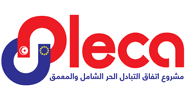This section « Frequently asked questions » is a section that wants to be dynamic, interactive, evolving in accordance with the advance of the DCFTA negotiations as well as the reactions of all stakeholders. Thus, understandably, it will expand to take into account all of your queries and reactions.
1- What is DCFTA ?
2- What does DCFTA represent for Tunisia ?
3- What are the objectives of the DCFTA agreement ?
4- What are the fields covered by the DCFTA agreement ?
5- What would the benefits for Tunisia be once DCFTA is finalised ?
6- Who negotiates the DCFTA agreement for Tunisia ?
7- When have we started talking about DCFTA and when did the negotiations start ?
8- Will the DCFTA agreement impose reforms on Tunisia ?
9- Will the DCFTA agreement respect Tunisia sovereignty in making its economic choices ?
10- Is there a calendar imposed on the DCFTA negotiations ?
11- Who should ratify the DCFTA agreement once finalized ?
12- Will there be any supporting measures of the DCFTA agreement similar to those made available at the 1995 agreement ?
13- Is the Tunisian Civil society engaged in the process of negotiations ?
14- What is the importance of the trade exchanges between Tunisia and the European Union ?
15- When does the first agreement of free trade between Tunisia and the EU take place?
16- Are there any review studies on the impact of the 1995 Association Agreement with the EU or still on the prospective impact of the DCFTA agreement on the Tunisian Economy ?


